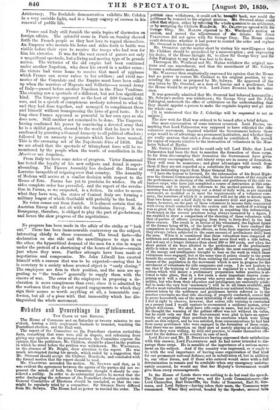France and Italy still furnish the mein topics u'f' discvssion
foreign affairs. The splendid scene in Paris on Sunday showed forth the French people as they best love to regard themselves.
An Emperor who mounts his horse and rides forth to battle was visible before their eyes to receive the troops who had won for him his victories. It was for the vast crowd of gazers not only a magnificent spectacle, but a living and moving type of la grande nation. The victories of the old empire had been continued under another Napoleon, who drew his sword in a nobler cause ; the victors had come home to receive that meed of applause which France can never refuse to her soldiers ; and vivid me- mories of the Consulate and the Empire must have been called up when the warriors of Magenta and Solferino—a second Army of Italy—passed before another Napoleon in the Place Vendome. The evening saw a spectacle of a different, but not less significant kind. The Emperor appeared as the host of 300 General Offi- cers, and in a speech of conspicuous modesty referred to what he and they had done together, and managed to compliment them and himself without transgressing the laws of good taste. It is long since France appeared so powerful in her own eyes as she does now. Still another act remained to be done. The Emperor, having confirmed his power by convincing a devoted army that he is a skilful general, showed to the world that he knew it was confirmed by granting a General Amnesty to all political offenders ; followed by an amnesty to journals which have been warned. This is the crowning act of the Napoleonic fetes of 1859. But we are afraid that the spectacle of triumphant force will be re- membered by the people when the words of conciliation in the Mon it e ur are forgotten.
From Italy we have some notes of progress. Victor Emmanuel has tested the loyalty of his new subjects and found it super- abounding. The Tuscan Assembly has declared the House of Lorraine incapable of reigning over that country. The Assembly of Modena will arrive at a similar decision with respect to the House of Este. Parma has yet to proclaim its wishes. On all sides complete order has prevailed, and the report of the revolu- tion in Parma, as we suspected, is a fiction. In order to secure what they have won, the states of Central Italy are forming a military league of which Garibaldi will probably be the head.
No voioe comes out from Zurich. It is almost certain that the Austrian Envoy will not sit with the Sardinian Envoy. M. de Bourqueny, therefore, is obliged to play the part of go-between; and hence the slow progress of the negotiations.


























 Previous page
Previous page